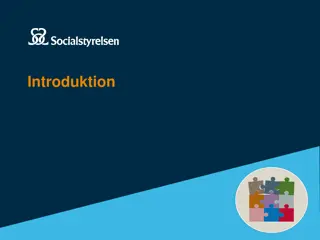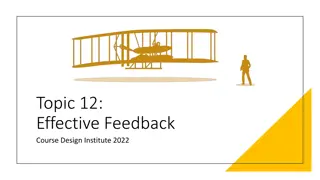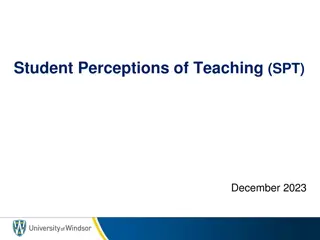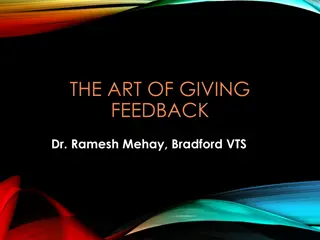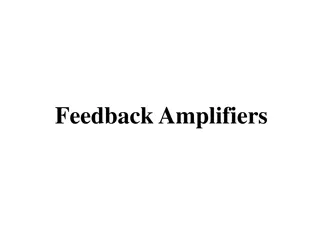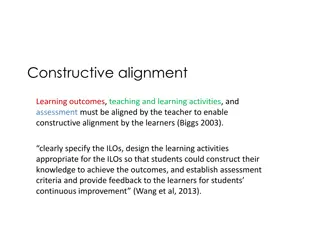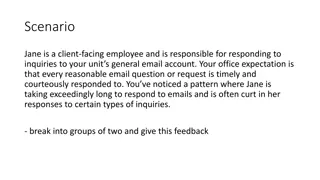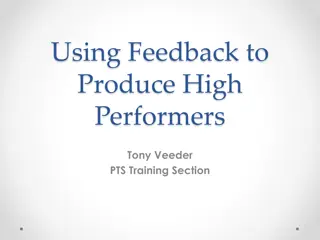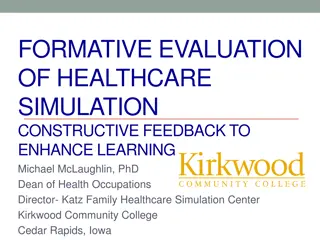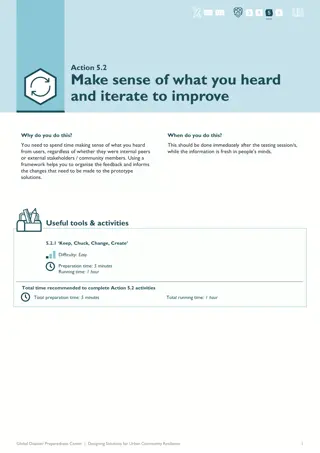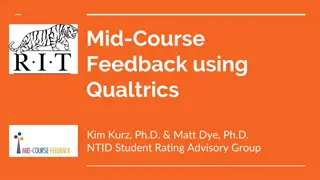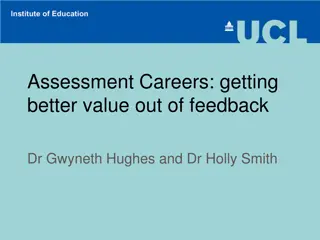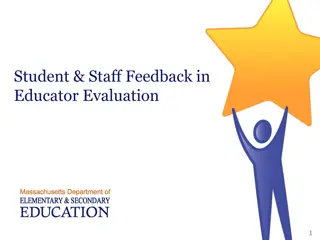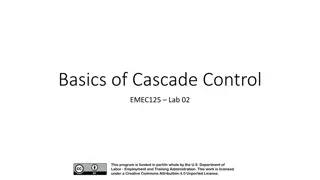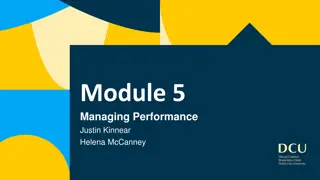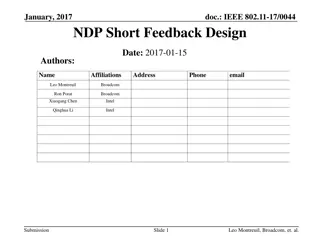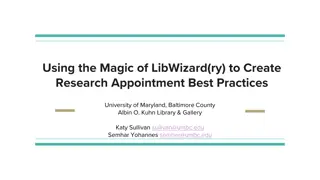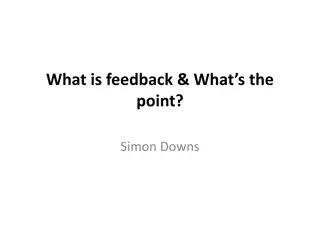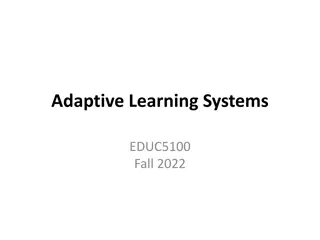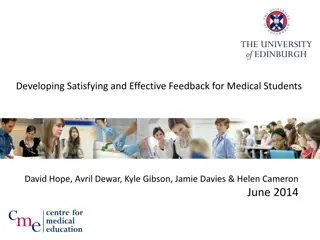Corporate Unconscionability
The concept of corporate unconscionability, including the exploitation of individuals in a special disadvantage. It explores the requirement of knowledge in cases of exploitation, such as actual knowledge, wilful blindness, recklessness, constructive knowledge, and constructive notice.
1 views • 18 slides
Empowering Students with Positive Attitudes
Discover the importance of positive attitudes among students and how teachers can promote optimism and constructive thinking. Learn how a positive mindset leads to happiness and success in life. Explore the ways positive attitude manifests and its benefits. Start each day with love and develop a con
1 views • 25 slides
Effective Reflection and Feedback Strategies in Professional Development
Explore the importance of reflection and feedback in professional growth within the social child welfare sector. Engage in exercises aimed at enhancing competency and collaboration among colleagues. Learn to provide and receive constructive feedback effectively to foster continuous learning and deve
2 views • 38 slides
Topic 12: Effective Feedback
Providing effective feedback and critique is crucial in academic settings to help students identify strengths, weaknesses, and areas for improvement. The process involves recognizing successes, suggesting improvements, and establishing a personal connection with students. Feedback aims to offer cons
2 views • 21 slides
Enhancing Student Learning Through Effective Feedback Strategies
Effective feedback plays a crucial role in improving student learning outcomes by providing specific information that students can use to enhance their performance. This content explores the importance of feedback, examples of good feedback practices, qualities of good feedback, and what components
5 views • 16 slides
Student Perceptions of Teaching (SPT) Survey Process
Providing feedback on teaching and course design through the Student Perceptions of Teaching (SPT) survey. Surveys are submitted online, with confidentiality ensured. The process includes grading instructor delivery, expectations, and feedback, focusing on various aspects of the learning environment
5 views • 10 slides
Constructive and Destructive Waves in Geographical Context
Exploring the characteristics of constructive and destructive waves in geography. Learn how waves are formed, what happens when they reach the coast, and their impact on the coastal environment. Dive into the dynamics of wave movement and the distinctions between constructive and destructive waves.
0 views • 10 slides
Effective Feedback Strategies for Learning Enhancement
Feedback plays a crucial role in the learning process. This session focuses on strategies for providing effective feedback to improve learning outcomes, course, and assignment design, best practices, and tools for efficient feedback delivery. Understanding the importance of prompt feedback and diffe
4 views • 20 slides
Constructive Criticism in College
Constructive criticism plays a vital role in personal growth and development. It distinguishes between constructive and destructive feedback, highlighting the intent behind criticism and its significance in college settings. Embracing feedback positively can enhance one's learning experience and aca
1 views • 13 slides
Mastering the Art of Giving Feedback
Learn the importance of feedback, how to provide it effectively, and why it is crucial for personal and professional development. Explore the positive impact feedback can have on performance, motivation, self-awareness, and insights. Discover practical tips on giving constructive criticism and creat
1 views • 39 slides
Feedback Amplifiers: Structure, Properties, and Topologies
Electronic circuits rely heavily on feedback mechanisms, particularly negative feedback, for various purposes such as desensitizing gain, reducing distortion, controlling impedance, and improving amplifier bandwidth. This article explores the general structure of feedback, properties of negative fee
0 views • 68 slides
Enhancing Feedback Practices with Audio-Visual Technology: A Study on Student Satisfaction and Attainment
This presentation delves into the implementation of Audio-Visual Feedback (AVF) technology to improve assessment feedback practices in an educational institution. The study explores the impact of AVF on student satisfaction levels compared to traditional written feedback, as well as its influence on
1 views • 21 slides
The Importance of Feedback in Achievement Enhancement
Feedback plays a crucial role in encouraging or discouraging behavior, making it essential to provide constructive feedback that focuses on growth and improvement. Improper feedback can lead to incompetence in the workplace. Learn about the definition of feedback, how to give feedback effectively, a
2 views • 22 slides
Feedback Amplifiers in Electronic Circuits
Feedback amplifiers play a crucial role in electronic circuits by providing mechanisms for controlling gain, stability, and overall performance. There are two basic types of feedback - positive and negative, each offering distinct advantages. The four ways of connecting feedback signals involve volt
1 views • 18 slides
Enhancing Feedback Strategies in ELA Learning Project Day
Refine understanding of ELA, engage with student exemplars, and design constructive feedback in a structured agenda. Activities include generating feedback, digging deeper into feedback processes, and considering the impact of timely and specific feedback on student growth in learning and skills. Co
0 views • 31 slides
Constructive Alignment in Teaching and Learning: A Comprehensive Guide
Constructive alignment emphasizes the importance of aligning learning outcomes, teaching activities, and assessments to enhance student learning. By clearly specifying learning outcomes, designing appropriate activities, and establishing assessment criteria with feedback, educators can foster constr
0 views • 6 slides
Effective Feedback Practices for Client-Facing Employees
Explore the importance of timely and courteous email responses in a client-facing role and learn how to provide constructive feedback to improve communication skills. Discover the benefits of active listening, tips for better engagement, and strategies for delivering positive feedback effectively. E
0 views • 8 slides
Effective Feedback Strategies for Resident Teachers
Effective feedback is critical for the growth of resident teachers. This guide covers types of feedback, why it's important, what makes feedback effective, behaviorally anchored rating scales, models for giving feedback, and key tips for delivering feedback successfully.
0 views • 14 slides
Effective Feedback Strategies for High Performance
Feedback plays a crucial role in helping individuals improve performance and reach their full potential. From providing helpful feedback to reinforcing desired behaviors, this guide explores various strategies, including redirection, reinforcement, and F.A.S.T. feedback, to enhance workplace perform
0 views • 21 slides
Enhancing Postgraduate Academic Writing: Feedback Collaboration Model
Developing a collaborative model for postgraduate academic writing courses involves understanding the role of feedback, focusing on content feedback, and exploring the intersections between discipline specialist and writing tutor feedback to improve academic writing abilities. Feedback offers valuab
2 views • 27 slides
Enhancing Healthcare Simulation Through Constructive Feedback
Explore the principles and benefits of healthcare simulation, focusing on formative evaluation and constructive feedback to improve learning outcomes. Delve into the role of formative assessment tools, TeamSTEPPS model, and Mayo High Performance Teamwork Scale in simulation scenarios. Discover the s
1 views • 37 slides
Iterative Feedback Framework for Prototype Improvement
The iterative feedback framework involves making sense of user feedback using the Keep, Chuck, Change, Create (KCCC) model to iterate and enhance prototype solutions. This process helps organize input from testing sessions, informing necessary modifications for better outcomes. The framework emphasi
2 views • 26 slides
Developing a Growth Mindset Through Feedback and Goal Setting
In "Growing a Mindset" by Robin Giles, the importance of feedback, goal setting, and mindset in fostering growth and development is explored. Emphasizing effort over attainment, providing constructive feedback on strengths and weaknesses, and setting active learning goals are key strategies discusse
0 views • 9 slides
Mid-Course Feedback Using Qualtrics
Mid-Course Feedback (MCF) is a valuable process that allows students to provide feedback on their courses mid-semester, impacting teaching strategies, communication, materials, and more. This feedback benefits both students and instructors by improving teaching effectiveness, student satisfaction, a
0 views • 21 slides
Enhancing Feedback Practices in Higher Education
Exploring issues and solutions related to feedback in higher education, this content discusses challenges faced by students and educators. It emphasizes the importance of constructive feedback and suggests the use of feedback response forms for both formative and summative assessments to enhance stu
0 views • 15 slides
Importance of Student and Staff Feedback in Educator Evaluation
Student and staff feedback plays a crucial role in educator evaluation, providing valuable insights into areas of strength and growth. Informed by evidence such as surveys, observations, and artifacts, feedback helps educators tailor their practice, fostering two-way communication and professional d
1 views • 14 slides
Start Smart Revised: Constructive Conversation Skills Workshop
Dive into the revised version of Start Smart to enhance students' Constructive Conversation skills through collaborative activities and discussions. Explore the differences between the original and revised lessons, share valuable insights, and provide feedback for continuous improvement.
1 views • 9 slides
Cascade Control Systems in Industrial Processes
Cascade control systems play a crucial role in improving process control efficiency by incorporating feedback loops within feedback loops. This type of control architecture helps to better handle disturbances and variations in the process by creating secondary loops that monitor specific parameters.
3 views • 8 slides
Enhancing Performance Through Effective Management
In this module on managing performance, participants will learn how to support others in their professional and personal development, give and receive positive feedback, and manage employee performance effectively. The session emphasizes clarity in communication, setting expectations, and the import
0 views • 34 slides
IEEE 802.11-17/0044 NDP Short Feedback Design
The document discusses the need for short simultaneous feedback from multiple STAs in IEEE 802.11 systems for improved efficiency. It introduces the NDP feedback mechanism and proposes a signaling technique to efficiently collect feedback from a high number of STAs. The mechanism involves UL MU tran
0 views • 19 slides
Effective Feedback Strategies for Prime Evaluators in Internal Medicine
Learn how to provide constructive feedback using the Prime rubric in Internal Medicine evaluations. Understand the differences between Reporter, Interpreter, and Manager-level students in written comments. Discover the importance of detailed feedback in helping students improve and its role in asses
0 views • 31 slides
AI Automation for Corrective Feedback in Language Learning
Exploring the utilization of AI technology to automate and enhance corrective feedback in language learning, addressing challenges such as time constraints, delayed feedback, and student comprehension. Introduction of a new AI text tool by Marcus Green for accessible and effective feedback provision
0 views • 13 slides
Constructive Receipt in Taxation
The doctrine of constructive receipt in taxation dictates that income, even if not physically received, is taxable when made available to the taxpayer. This principle applies to various scenarios such as interest credited to accounts and compensation for services rendered. Failure to recognize const
0 views • 19 slides
Enhancing Research Appointment Services at UMBC Library
UMBC subject librarians implemented a feedback survey to improve research appointment services. By analyzing feedback data, shared best practices were developed to ensure quality and consistency. The project timeline included identifying goals, drafting the timeline, creating the feedback form, and
0 views • 7 slides
The Importance of Feedback in Learning and Development
Feedback plays a crucial role in providing information about performance or behavior to affirm strengths and improve weaknesses. It helps individuals become consciously competent by identifying areas for improvement through formative assessment. Effective feedback enhances motivation, promotes learn
0 views • 33 slides
IEEE 802.11-19/0709r0 - Immediate and Delayed Feedback May 2019
The document discusses immediate and delayed feedback mechanisms in IEEE 802.11-19/0709r0, focusing on parameters, feedback types, and ranging options. It explores variations in feedback direction and types, proposing options for phase shift feedback and distinguishing between RSTA-to-ISTA and ISTA-
1 views • 6 slides
Product Feedback Forum at NWS: Provisional PS-PVR User Feedback on ABI, CMI, and L1b
A comprehensive feedback system managed by PRO at NWS, focusing on user input for GOES-R products such as ABI, CMI, and L1b. The forum gathers feedback through surveys and weekly calls, addressing product quality issues and ensuring effective communication with field sites. Noteworthy discussions in
0 views • 18 slides
Feedback in Learning Systems
Exploring the role of feedback in educational settings, this content delves into the concept of providing information to learners by various agents. It discusses the importance of feedback in guiding learning progress, highlighting examples of correctness feedback and correct answer feedback. The be
0 views • 66 slides
Feedback and Mentoring Workshop for HIV Researchers
Mentoring workshop for HIV researchers focusing on giving and receiving feedback, nurturing early career investigators, and working with faculty continuum. The workshop offers insights on feedback exercises, assumptions, and rhetorical questions about feedback. Participants are encouraged to reflect
0 views • 33 slides
Effective Feedback for Medical Students: Insights from Research
In this study, the Edinburgh Feedback Project explored the impact of feedback on medical students' performance and satisfaction. Findings revealed students' preferences, the link between satisfaction and performance, and strategies for enhancing feedback effectiveness. The research underscores the i
1 views • 23 slides


